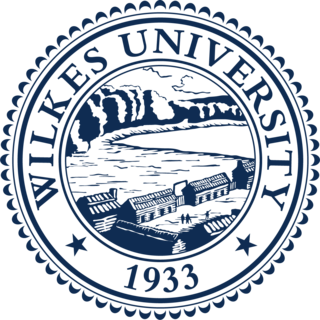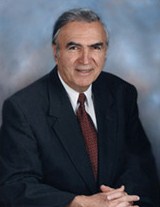Related Research Articles

John Wilkes was an English radical journalist and politician,as well as a magistrate,essayist and soldier. He was first elected a Member of Parliament in 1757. In the Middlesex election dispute,he fought for the right of his voters—rather than the House of Commons—to determine their representatives. In 1768,angry protests of his supporters were suppressed in the Massacre of St George's Fields. In 1771,he was instrumental in obliging the government to concede the right of printers to publish verbatim accounts of parliamentary debates. In 1776,he introduced the first bill for parliamentary reform in the British Parliament.

Wilkes University is a private university in Wilkes-Barre,Pennsylvania. It has over 2,200 undergraduates and over 2,200 graduate students. Wilkes was founded in 1933 as a satellite campus of Bucknell University,and became an independent institution in 1947,naming itself Wilkes College,after English radical politician John Wilkes after whom Wilkes-Barre is named. The school was granted university status in January 1990. It is classified among "Doctoral/Professional Universities". Wilkes University is accredited by the Commission on Higher Education of the Middle States Association of Colleges and Secondary Schools.

George William Gekas was an American politician from Pennsylvania who served as a Republican member of the U.S. House of Representatives for Pennsylvania's 17th congressional district from 1983 to 2003.

The United States Exploring Expedition of 1838–1842 was an exploring and surveying expedition of the Pacific Ocean and surrounding lands conducted by the United States. The original appointed commanding officer was Commodore Thomas ap Catesby Jones. Funding for the original expedition was requested by President John Quincy Adams in 1828;however,Congress would not implement funding until eight years later. In May 1836,the oceanic exploration voyage was finally authorized by Congress and created by President Andrew Jackson.

William Scott Vare was an American politician from Pennsylvania who served as a Republican member of the United States House of Representatives for Pennsylvania's 1st congressional district from 1912 to 1927. He also served as a member of the Pennsylvania State Senate from the 1st Senatorial District from 1922 to 1923. He won election to the United States Senate for Pennsylvania in 1926 but was never seated and was eventually removed in 1929 due to allegations of corruption and voter fraud.
William Piper was an American politician from Pennsylvania who served as a Democratic-Republican member of the U.S. House of Representatives for Pennsylvania's 7th congressional district from 1811 to 1813 and for Pennsylvania's 8th congressional district from 1813 to 1817.
The 1768 British general election returned members to serve in the House of Commons of the 13th Parliament of Great Britain to be held,after the merger of the Parliament of England and the Parliament of Scotland in 1707.
William J. Moore,Sr. was a member of the Pennsylvania State Senate,serving from 1973 to 1988. He was a Republican member of the Pennsylvania House of Representatives from 1971 to 1972. He died in 2015.
William E. Baldwin is a former Democratic member of the Pennsylvania House of Representatives. He was elected to Court of Common Pleas of Schuylkill County on November 3,1987.
The 1856–57 United States Senate elections were elections which had the young Republican Party assume its position as one of the United States's two main political parties. The Whigs and Free Soilers were gone by the time the next Congress began.
The 1844–45 United States Senate elections were elections which,coinciding with James K. Polk's election,had the Democratic Party retake control of the United States Senate,gaining a net total of eleven seats from the Whigs.
The 1890–91 United States Senate elections were elections in which the Republican Party lost four seats in the United States Senate,though still retaining a slim majority. That majority was increased,however,upon the admission of two more states with Republican senators.
The 1860–61 United States Senate elections were elections corresponding with Abraham Lincoln's election to the presidency. The nascent Republican Party increased their Senate seats in the regular elections,and after southern Democrats withdrew to join the Confederacy,Republicans gained control of the United States Senate. To establish a quorum with fewer members,a lower total seat number was taken into account.

The 1788 United States Senate election in Pennsylvania,held on September 30,1788,was the first United States Senate election held in Pennsylvania. The Pennsylvania General Assembly,consisting of the House of Representatives and the Senate,elected Pennsylvania's first two United States Senators,William Maclay and Robert Morris.

The 1820–1821 United States Senate election in Pennsylvania was held on three separate dates from December 1820 to December 1821. On December 10,1821,William Findlay was elected by the Pennsylvania General Assembly to the United States Senate.

The 1830 United States Senate election in Pennsylvania was held on from December 14 to 16,1830. William Wilkins was elected by the Pennsylvania General Assembly to the United States Senate.

The 1834 United States Senate special election in Pennsylvania was held on December 6,1834. Future President of the United States James Buchanan was elected by the Pennsylvania General Assembly to the United States Senate.

The 1856 United States Senate election in Pennsylvania was held on January 14,1856. William Bigler was elected by the Pennsylvania General Assembly to the United States Senate.

The 1861 United States Senate election in Pennsylvania was held on January 8,1861. Edgar Cowan was elected by the Pennsylvania General Assembly to the United States Senate.
References
- ↑ "William Wachob".
- ↑ Cox, Harold. "House Members W". Wilkes University Election Statistics Project . Wilkes University.